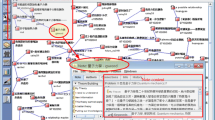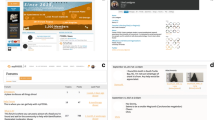Abstract
Science Cafés create open, public forums to promote the exchange of ideas between science experts and the public. This study explored Science Café attendees’ interest in science content, and motivational factors in attending events as well as documenting what attendees did with the information presented at an event through the means of a survey (n = 124) and interviews (n = 17). The Synthesized Elements for Informal Learning Experiences at Science Cafés represents a merged perspective of informal learning environments, based on self-determination theory and the contextual model of learning. The synthesized elements (endogenous and ecological) may provide an explanation of the public’s motivation in attending Science Café events. Based on survey and interview data, the majority of participants reported endogenous elements (knowledge and learning; fulfills personal needs) as motivational factors to attend Science Café events. Additionally, attendees stated ecological elements, such as social interactions, with other attendees and science experts were significant motivational influences to attend events. Survey and interview respondents cited they share and discuss the information gained from a Science Café event with others in their social network (e.g., family members, friends, and colleagues). This information may inform best practices in connecting the community to science experts in order to share scientific endeavors and documenting the profound effect science has on the public.
Similar content being viewed by others
References
Ahmed, S., Defino, M., Connors, E., Kissack, A., & Franco, Z. (2014). Science Cafés: engaging scientists and community through health and science dialogue. Clinical and Translational Science, 7(3), 196–200.
Author 1a (2017): Jones, M.G., Andre, T., Corin, C., Childers, G., & Stevens, V. (2017). Factors contributing to lifelong science learning: Amateur astronomers and birders. Journal of Research in Science Teaching, 54(3), 412–433.
Author 1b (2018): Jones, M.G., Childers, G., Andre, T., Corin, E., & Hite, R. (2018). Citizen scientists and non-citizen scientist hobbyists: Motivation, benefits, and influences. International Journal of Science Education, Part B, 8(4), 287–306.
Bazilio, A., Ryan, A., & Welborn, J. (2016). Science Cafés. Science Scope, 40(3), 14–17.
Bonney, R., Phillips, T. B., Ballard, H. L., & Enck, J. W. (2016). Can citizen science enhance public understanding of science? Public Understanding of Science, 25(1), 2–16.
Clery, D. (2003). Bringing science to the cafes: forget the digestive biscuits and clotted cream: Britain's most sumptuous export could soon be a trendy new concept called Cafe Scientifique. Science, 300(5628), 2026.
Creswell, J. W., & Clark, V. L. P. (2017). Designing and conducting mixed methods research (3rd ed.). Sage Publications.
Deci, E. L., & Ryan, R. M. (2000). The “what” and “why” of goal pursuits: human needs and the self-determination of behavior. Psychological Inquiry, 11(4), 227–268.
Deci, E. L., Vallerand, R. J., Pelletier, L. G., and Ryan, R. M. (1991). Motivation and education: the self-determination perspective. Educational Psychologist, 26 (3 and 4), 325-346.
Dijkstra, A. M. (2017). Analysing Dutch Science Cafés to better understand the science-society relationship. Journal of Science Communication, 16(1), C1–C1.
Dijkstra, A. M., & Critchley, C. (2016). Nanotechnology in Dutch Science Cafés: public risk perceptions contextualized. Public Understanding of Science, 25(1), 71–87.
Falk, J. H., & Dierking, L. D. (2000). Learning from museums: visitor experiences and the making of meaning. Walnut Creek, CA: Altamira Press.
Falk, J. H., & Needham, M. D. (2013). Factors contributing to adult knowledge of science and technology. Journal of Research in Science Teaching, 50(4), 431–452.
Falk, J., & Storksdieck, M. (2005). Using the contextual model of learning to understand visitor learning from a science center exhibition. Science Education, 89(5), 744–778.
Falk, J., & Storksdieck, M. (2010). Science learning in a leisure setting. Journal of Research in Science Teaching, 47(2), 194–212.
Falk, J. H., Storksdieck, M., & Dierking, L. D. (2007). Investigating public science interest and understanding: evidence for the importance of free-choice learning. Public Understanding of Science, 16(4), 455–469..
Grand, A. (2014). Café Scientifique. Science Progress, 97(3), 275–278.
Grusec, J. E. (1992). Social learning theory and developmental psychology: the legacies of Robert Sears and Albert Bandura. Developmental Psychology, 28(5), 776–786.
Lemke, J. L. (2001). Articulating communities: sociocultural perspectives on science education. Journal of Research in Science Teaching, 38(3), 296–316.
Martin, A., Durksen, T., Williamson, D., Kiss, J., & Ginns, P. (2016). The role of a museum-based science education program in promoting content knowledge and science motivation. Journal of Research in Science Teaching, 53(9), 1364–1384.
National Academies of Sciences, Engineering and Medicine. (2018). How people learn II: learners, contexts, and cultures. Washington, DC: National Academies Press.
National Research Council. (2009). Learning science in informal environments: people, places, and pursuits. Washington, DC: National Academies Press.
National Research Council. (2010). Surrounded by science: learning science in informal environments. Washington, DC: National Academies Press.
Navid, E. L., & Einsiedel, E. F. (2012). Synthetic biology in the Science Café: what have we learned about public engagement? Journal of Science Communication, 11(4), 1–9.
Nielsen, K., Balling, G., Hope, T., & Nakamura, M. (2015). Sipping science: the interpretative flexibility of Science Cafés in Denmark and Japan. Technology and Society, 9(1), 1–21.
Norton, M., & Nohara, K. (2009). Science Cafés. Cross-cultural adaptation and educational applications. Journal of Science Communication, 8(4), 1–12.
Ramey-Gassert, L. (1997). Learning science beyond the classroom. The Elementary School Journal, 97(4), 433–450.
Robinson, C. (2017). Add more STEAM to your classes. Science Scope, 41(1), 18–22.
Rose, K. M., Korzekwa, K., Brossard, D., Scheufele, D. A., Heisler, L. (2017). Engaging the public at a science festival: Findings from a panel on human gene editing. Science Communication, 39, 250–277
Ryan, R., & Deci, E. (2000). Self-determination theory and the facilitation of intrinsic motivation, social development and well-being. American Psychologist, 55(1), 68–78.
Saldaña, J. (2015). The coding manual for qualitative researchers. Sage.
Spoel, P., Goforth, D., Cheu, H., & Pearson, D. (2008). Public communication of climate change science: engaging citizens through apocalyptic narrative explanation. Technical Communication Quarterly, 18(1), 49–81.
Thornberg, R., & Charmaz, K. (2014). Grounded theory and theoretical coding. The SAGE handbook of qualitative data analysis, 5, 153–169.
Author information
Authors and Affiliations
Corresponding author
Additional information
Publisher’s Note
Springer Nature remains neutral with regard to jurisdictional claims in published maps and institutional affiliations.
Rights and permissions
About this article
Cite this article
Childers, G., Governor, D., Osmond, D. et al. Science Cafés: Exploring Adults’ Motivation to Learn Science in a Community Space. Res Sci Educ 52, 1055–1073 (2022). https://doi.org/10.1007/s11165-020-09982-2
Accepted:
Published:
Issue Date:
DOI: https://doi.org/10.1007/s11165-020-09982-2




